UnitWhatshouldIdo(教案二)
[小初高学习]Unit 2 What should I do-(上课学习上课学习教案二)
![[小初高学习]Unit 2 What should I do-(上课学习上课学习教案二)](https://img.taocdn.com/s3/m/1c5d7e1d3169a4517723a33d.png)
Unit 2 What should I do?(教案二)Unit2whatshouldIdo?(教案二)一、知识点拨I.LanguageGoals•学会谈论有关生活中的问题。
•学会针对别人的问题给出建议。
•能针对所提出的建议做出评价。
II.keywords.arguev.争论;争吵arguewithsb.与某人吵架Iarguedwithmybestfriend.我和我的好朋友吵架了。
2.eitheradv.(用于否定句)也Hedoesn'thaveanymoney,andIdon't,either.他没有钱,我也没有。
too也(用于肯定或疑问句)I'mateacher.Heisateacher,too.我是老师,他也是老师。
3.ask(sb.)forsth.向某人寻求某物;要……Don'taskforfoodeveryday.Goandfindsomework.别天天要饭,找点儿工作做。
Idon'tthinkyoushouldaskyourparentsforsomemoney.我想你不应该向父母要钱。
Hedidn'twanttoaskhisteacherforhisbookhack.他不想向老师要回他的书了。
4.thesameas...与……相同Theclothesarethesameasmyfriends'.这些衣服与我朋友的一样。
TomisthesameageasAnna.=TomisasoldasAnna.汤姆和安娜一样大。
5.except除……以外;(不包括……在内)myclasshasbeeninvitedexceptme.=onlyIhaven'tbeeninvited.除我以外,我的同学都被邀请了。
Allthestudentswenttotheparkexcepthim.=onlyhedidn'tgettothepark.besides除……以外(包括在内)除他以外,所有的学生都去了公园。
英语人教版八年级下《Unit2WhatshouldIdo》教案2
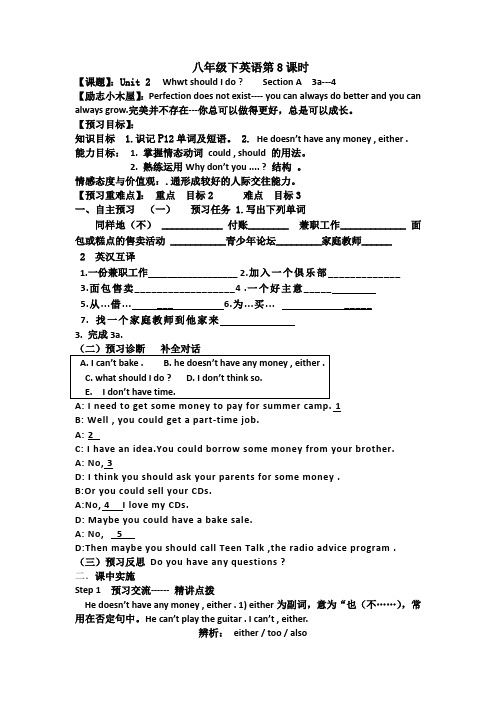
八年级下英语第8课时【课题】:Unit 2 Whwt should I do ?Section A 3a---4【励志小木屋】:Perfection does not exist---- you can always do better and you can always grow.完美并不存在---你总可以做得更好,总是可以成长。
【预习目标】:知识目标 1.识记P12单词及短语。
2. He doesn’t have any money , either .能力目标: 1. 掌握情态动词could , should 的用法。
2. 熟练运用Why don’t you .... ? 结构。
情感态度与价值观:.通形成较好的人际交往能力。
【预习重难点】:重点目标2 难点目标3一、自主预习(一)预习任务 1.写出下列单词同样地(不) ____________ 付账________ 兼职工作_____________ 面包或糕点的售卖活动 ___________青少年论坛_________家庭教师______2 英汉互译1.一份兼职工作__________________2.加入一个俱乐部_____________3.面包售卖__________________4 .一个好主意_____5.从...借... ___6.为...买... _____7. 找一个家庭教师到他家来3. 完成3a.A: I need to get some money to pay for summer camp. 1B: Well , you could get a part-time job.A: 2C: I have an idea.You could borrow some money from your brother.A: No, 3D: I think you should ask your parents for some money .B:Or you could sell your CDs.A:No, 4 I love my CDs.D: Maybe you could have a bake sale.A: No, 5D:Then maybe you should call Teen Talk ,the radio advice program .(三)预习反思Do you have any questions ?二.课中实施Step 1 预习交流------ 精讲点拨He doesn’t have any money , either . 1) either为副词,意为“也(不……),常用在否定句中。
八年级上复习学教案Unit 2 What should I do
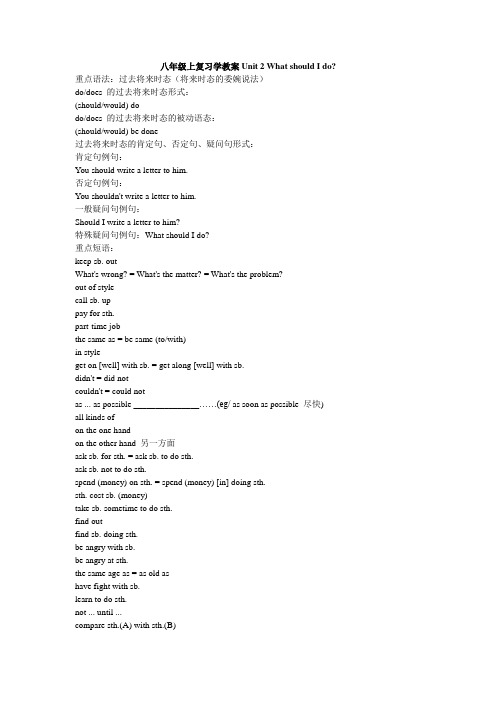
八年级上复习学教案Unit 2 What should I do?重点语法:过去将来时态(将来时态的委婉说法)do/does 的过去将来时态形式:(should/would) dodo/does 的过去将来时态的被动语态:(should/would) be done过去将来时态的肯定句、否定句、疑问句形式:肯定句例句:You should write a letter to him.否定句例句:You shouldn't write a letter to him.一般疑问句例句:Should I write a letter to him?特殊疑问句例句:What should I do?重点短语:keep sb. out _____________What's wrong? = What's the matter? = What's the problem? ______________ out of style _______________call sb. up _______________pay for sth. _______________part-time job _______________the same as = be same (to/with) __________in style _______________get on [well] with sb. = get along [well] with sb. _______________didn't = did notcouldn't = could notas ... as possible _______________……(eg/ as soon as possible 尽快)all kinds of _______________on the one hand_______________on the other hand 另一方面ask sb. for sth. = ask sb. to do sth. _________ask sb. not to do sth. _______________spend (money) on sth. = spend (money) [in] doing sth. _______________ sth. cost sb. (money) _______________take sb. sometime to do sth. _____________find out_______________find sb. doing sth. _______________be angry with sb. _______________be angry at sth. ______________the same age as = as old as _______________have fight with sb. _______________learn to do sth. _______________not ... until ... _______________compare sth.(A) with sth.(B) ____________it's time for sth. = it's time to do sth. ________maybe adv. _______________may be (情态动词+ 动词原形)________shall → should 情态动词shall 的原形和过去式pay → paid → paid 动词pay 的原形、过去式和过去分词Reading Strategy(阅读方法)You will learn to use new words better if you use a learner's dictionary. (时刻学着应用新单词来学习比时刻使用字典这种途径方法更好。
教案二WhatshouldIdo
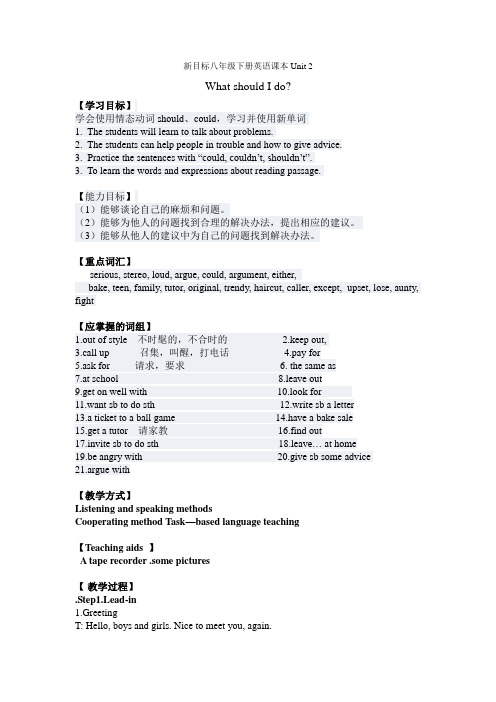
新目标八年级下册英语课本Unit 2What should I do?【学习目标】学会使用情态动词should、could,学习并使用新单词1. The students will learn to talk about problems.2. The students can help people in trouble and how to give advice.3. Practice the sentences with “could,couldn’t,shouldn’t”.3. To learn the words and expressions about reading passage.【能力目标】(1)能够谈论自己的麻烦和问题。
(2)能够为他人的问题找到合理的解决办法,提出相应的建议。
(3)能够从他人的建议中为自己的问题找到解决办法。
【重点词汇】serious, stereo, loud, argue, could, argument, either,bake, teen, family, tutor, original, trendy, haircut, caller, except, upset, lose, aunty, fight【应掌握的词组】1.out of style 不时髦的,不合时的2.keep out,3.call up 召集,叫醒,打电话4.pay for5.ask for 请求,要求6. the same as7.at school 8.leave out9.get on well with 10.look for11.want sb to do sth 12.write sb a letter13.a ticket to a ball game 14.have a bake sale15.get a tutor 请家教16.find out17.invite sb to do sth 18.leav e… at home19.be angry with 20.give sb some advice21.argue with【教学方式】Listening and speaking methodsCooperating method Task—based language teaching【Teaching aids 】A tape recorder .some pictures【教学过程】.Step1.Lead-in1.GreetingT: Hello, boys and girls. Nice to meet you, again.S: Nice to meet you, teacherT:OK,Who is on duty today?S: I amT:Ok, Are we all here?S: No, Wang Hua is not here.T: What’s the weather like today?S:Fine.T:Thank you ,sit down pleaseStep2: PresentationT:well,I want ask you some questiongs,Li Hua,please。
英语八年级下教学设计Unit2WhatshouldIdo
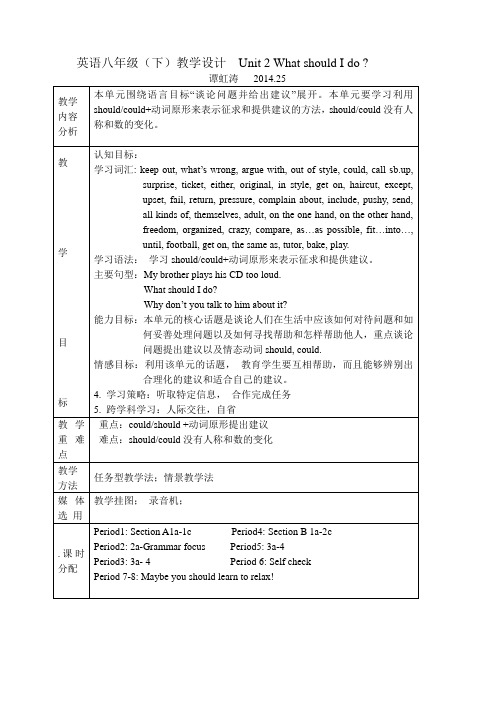
S1:What's wrong with you?
S2: What's the matter with you?
S3: Is there anything wrong with you?
T: I want to buy a car, but I don't have enough money. What should I do?
Maybe you should buy some new clothes.
教
学
步
骤
Step 1. leading—in
Greet students
Duty report: show the pictures of the robots on page 9 (section 4) and talks about them.
T: Yes, quite right. She thinks her clothes are not popular or fashionable. They areout of style.
T: What should she do?
Ss: She should buy some new clothes.
S4: Maybe we should plant more trees and flowers.
S5: We shouldn't throw the rubbish on the ground.
S6: We should protect the environment.
S7: We shouldn't cut down the trees.
八年级英语WhatshouldIdo教案
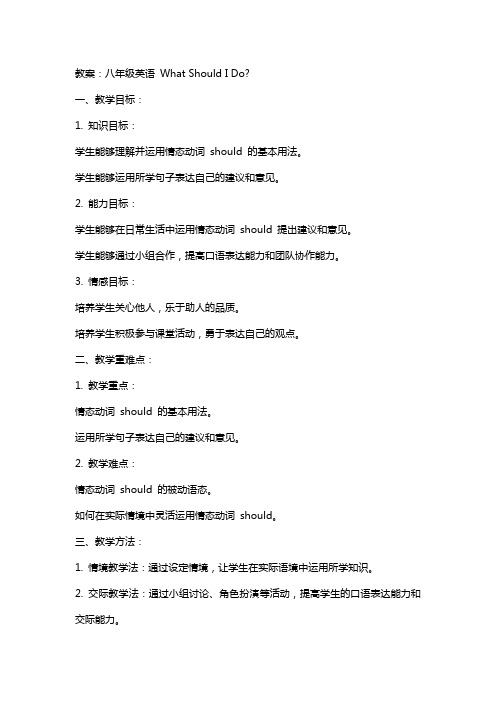
教案:八年级英语What Should I Do?一、教学目标:1. 知识目标:学生能够理解并运用情态动词should 的基本用法。
学生能够运用所学句子表达自己的建议和意见。
2. 能力目标:学生能够在日常生活中运用情态动词should 提出建议和意见。
学生能够通过小组合作,提高口语表达能力和团队协作能力。
3. 情感目标:培养学生关心他人,乐于助人的品质。
培养学生积极参与课堂活动,勇于表达自己的观点。
二、教学重难点:1. 教学重点:情态动词should 的基本用法。
运用所学句子表达自己的建议和意见。
2. 教学难点:情态动词should 的被动语态。
如何在实际情境中灵活运用情态动词should。
三、教学方法:1. 情境教学法:通过设定情境,让学生在实际语境中运用所学知识。
2. 交际教学法:通过小组讨论、角色扮演等活动,提高学生的口语表达能力和交际能力。
3. 任务型教学法:通过完成具体任务,培养学生运用英语解决实际问题的能力。
四、教学过程:1. 热身(5分钟)教师与学生进行简单的英语对话,检查学生的英语水平。
学生进行小组讨论,分享彼此的兴趣爱好。
2. 引入(10分钟)教师展示一张图片,引导学生思考图片中的人应该做什么。
学生用英语表达自己的观点,引出情态动词should 的用法。
3. 教学新课(15分钟)教师讲解情态动词should 的基本用法,并举例说明。
学生跟随教师一起练习,巩固所学知识。
4. 小组活动(10分钟)学生分组,每组讨论一个情境,用情态动词should 提出建议和意见。
各组汇报讨论结果,其他组进行评价。
学生完成课后作业,运用情态动词should 提出建议和意见。
五、课后作业:1. 抄写本节课所学的句子,并用自己的词汇替换句子中的关键词。
2. 编写一个情境,运用情态动词should 提出建议和意见。
3. 预习下一节课的内容,准备进行课堂讨论。
六、教学评价:1. 课堂参与度:观察学生在课堂活动中的积极参与程度,以及他们的表现和态度。
获奖教学设计UnitWhatshouldIdo
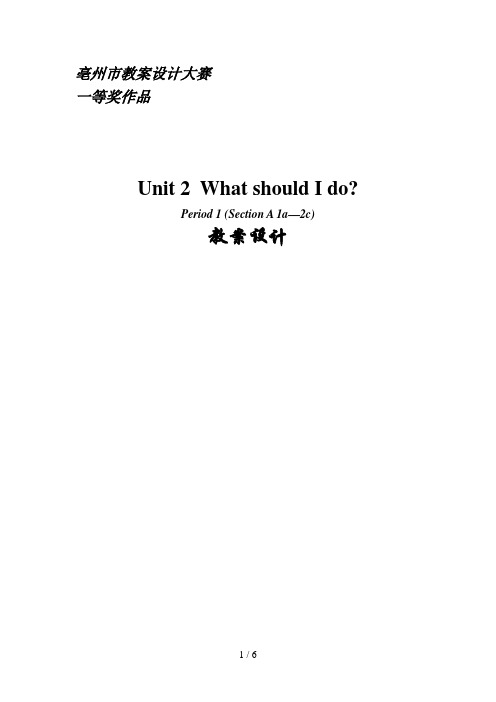
亳州市教案设计大赛一等奖作品Unit 2 What should I do?Period 1 (Section A 1a—2c)教案设计Unit 2 What should I do?Period 1 (Section A 1a—2c)Teaching material:Section A of Unit 2, Book II, Grade 8, Go for it.Language goals:1.Talk about problems which students come up against in their dailylives.2.Give advice to others and help them find solutions to their problems.3.Think out solutions to one’s own problems.Language structures:e modal verbs could and should to make suggestions.e the following sentences patterns to give advice:You could do…Maybe you should do…I think you shouldn’t do…You’d better do…e the following sentences patterns to evaluate others’ advice:What do you think of this advice?I think it’s a good idea( an okay idea, a bad idea).I agree/disagree with you.Teaching important and difficult points:Talk about problems and give adviceLearningstrategy:1.Listen for particular messages.2.Cooperate with others and fulfill a task.Key vocabulary:argue with…, play one’s CDs too loud, be out of style, keep out, could, call up, talk on the phone, surprise, ticket ,what’s the matter? etc. Teaching Methods:Listening and speaking methodsCooperating methodTask—based language teachingTeaching aids : A tape recorder .some picturesTeaching steps:StepⅠ: The basis of review, the word competition (基础回顾,单词大比拼).Remember the words and phrases as quickly as you cankeep...out play…too loud argue what’s wrong?in style out of style could call sb upsurprise a ticket to… what’s the matter?talk on the phoneStepⅡ:Independent learning, cooperative inquiry(自主学习,合作探究).⒈ keep oute.g. 别让那狗进入我房间。
【知识学习】Unit 2 What should I do -教案
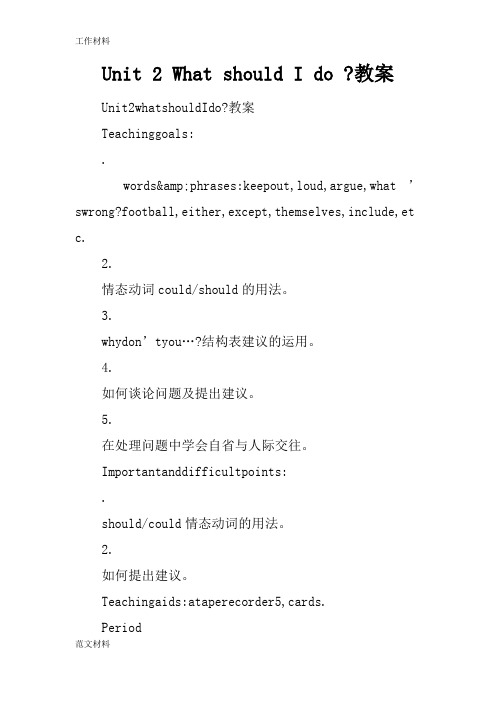
Unit 2 What should I do ?教案Unit2whatshouldIdo?教案Teachinggoals:.words&phrases:keepout,loud,argue,what’swrong?football,either,except,themselves,include,etc.2.情态动词could/should的用法。
3.whydon’tyou…?结构表建议的运用。
4.如何谈论问题及提出建议。
5.在处理问题中学会自省与人际交往。
Importantanddifficultpoints:.should/could情态动词的用法。
2.如何提出建议。
Teachingaids:ataperecorder5,cards.PeriodTeachingprocedures:Step1Leadingin.Greetingsandfreetalk.2.checkthehomework.Step2Pre-taskT:IwanttobuyanewguitarbutIdon’thaveenoughmoney.whatshouldIdo?Ssthinkitover,andtrytogivehis/heradvice.writetheiradviceontheBb..Borrowone.2.Buyasecond-handguitar.3.Getapart-timejob.4.Don’tbuyaguitar.5.waituntilnextyear.PracticereadingtheadvicebytheSs.导入:Inthisunitwearegoingtotalkaboutproblemspeoplehav eandlearnhowtogivethesepeopleadvice–totellpeoplewhatwethinktheyshoulddo.Step3while-taskSBPage10,1a..ReadtheinstructionstotheSs.2.ReadtheproblemsbytheSs.3.AskSstowritetheproblemsinthe“Serious”or “Notserious”columns.4.Explain.5.Talkabouttheanswerswiththeclass.Practicereading.SBPage10,1b.makesuretheSsunderstandwhatshouldtheydo.Playthetape twice.Sscircletheproblemstheyhear.Playthetapeathird time.checktheanswers.Step4Post-taskSBPage10,1c.Lookattheproblemsinactivity1aandmakeconversations.Step5while-taskSBPage11,2a..Readtheinstructions.makesuretheSsunderstandwhatshou ldtheydo.2.Pointtothesentencesbelow.3.Playthetapethefirsttime.Ssonlylisten.Payattentionto Peter’sfriend’sadvice.4.Playthetapeagain.Sscircle“could”or“should”.5.correcttheanswers.SBPage11,2b.Readtheinstructions.PayattentiontoPeter’sanswers.Playthetapeagain.checktheanswers.Step7Post-taskmakeconversationswithpeterandhisfriendwiththehelpof 2a&2b.Step8GrammarFocusReviewthegrammarbox.Sssaythequestionsandtheresponse s.Explainthedifferencesbetweencould/should.Homework:.Gooverthewords.2.myclothesareoutofstyle,whatshouldIdo?Pleasegivethea dvice.教学后记:Period2Teachingprocedures:Step1Leadingin.Greetingandfreetalk.2.checkthehomework.collectthestudents’advice.writeitdownontheBb.Step2Pre-task.Reviewthedifferencesbetween“could/should”.2.LearnthenewwordsinPage12.Step3while-taskSBPage12,3a..Readtheinstructions.2.ReadtheconversationsbySsorlistentothetape.Thenwrite “goodidea”“okayidea”or“badidea”.3.Talkaboutthestudents’answers.4.makesurethestudentsunderstandthedialogue.Practicere adingStep4Post-taskSBPage12,3b..Readtheinstructions.Pointouttheexampleconversationa ndasktwostudentstoreadittotheclass.2.Useyourhead.Findsomeotherwaystogetmoneythataren’tinthebook.3.AskSstoworkwithpartnerastheyaskforandgiveadvice.4.Pairwork.5.Actouttheconversationstotheclass.Step5while-taskSBPage12,Part4..Readtheinstructions.makesuretheSsunderstandwhatthey shoulddo.2.Tostudentsreadthedialogue.3.Practicereading.4.Askanotherpairtogivetheiradviceonanothertopic.5.Pairwork.Homework:将下列短语或句型译为汉语.keepout2.outofstyle3.what’swrong?4.callsbup5.payfor6.askforsomething7.summercamp8.stayathome教学后记:Period3 Teachingprocedures: Step1Leadingin. Greetingsandfreetalk.2. checkthehomework.Step2Pre-taskSBPage13,1a..Readtheinstructionstothestudents.2.Readthesentencesandaskastudenttoreadthesentencestot heclass.3.writeNI,I,VIforeachstatement.4.“whatisimportanttoyouwhenyouchooseclothes?”writeoneormoreoftheirstatementstotheclass.Talkabouttheanswerswiththeclass.Step3while-taskSBPage13,2a..Readtheinstructions.makesuretheSsunderstandwhatthey shoulddo.2.Readthethreesentencesinthebox.youwillbelisteningtoa radioadviceprogram.Theywillbetalkingaboutoneofthese problems.3.Playthetapetwice.Sschecktheproblemtheyhear.4.Playthetapeagain,Sscorrecttheanswers.SBPage13,2b..Readtheinstructions.makesureSsunderstandwhattheysho uldpayattentionto.2.Lookatthechart.Therearethreepersons,kim,Nicole,Emil io.whowillgiveErinsomeadvice?whatarethey?Readeachna mefortheclass.3.Playtherecordingagain.Sswritetheiranswers.4.Playtherecordingagain,onesentencebyonesentence.checktheanswers.Step4Post-taskSBPage13,2c..Pointouttheexampleinthesampledialogue.Sspracticerea ding.2.Pairwork:whatdoyouthinkErinshoulddo?3.Sharetheirconversationswithwholeclass.Homework:youleftyourhomeworkathome,whatshouldyoudo?Pleasegiv eyouradvice.教学后记:Period4Teachingprocedures:Step1Leadingin.Greetings&freetalk.2.checkthehomework:Ileftmyhomeworkathome,whatshouldId o?Sharesomestudents’advice.Step2while-taskSBPage14,3a..Scanthisletter,underlinetheproblem.2.Readtheletteragain,tickoutthenewwords.3.Explainsomething:except=but除…之外(不包括在内)besides除…之外(包括在内)Allthestudentswenttotheparkexcepthim.LucyandLilywillcometothepartybesidesme.findout=learned了解到find找到Ijustfindoutthereisadancetomorrow.4.Listentotherecording.Sspracticereading. SBPage14,3b..Pairwork:Givesomeadvicetothelonelykidin3a. 2.Supposeyou’remary.writethelettersonyourown.3.Readtheletterstotheclass.SBPage14,Part4..Readtheprobleminthebox.2.Twostudentsreadthedialogue.3.Pairwork:Thinkthemoverandgiveyouradvice.4.Groupwork:Seewhichclassmatehasthebestadvice. Step3Post-taskSBPage15,Selfcheck..Fillintheblankswiththewordsgiven.Trytomakeyourownse ntenceswiththewords.2.ReadthelettertoAuntchen’sadvicecolumnandthenwritesomeadvice.Homework:what’syourproblem?Pleasewriteyourownlettertoanadvicecolu mn.教学后记:Period5Teachingprocedures:Step1Leadingin.Greetingsandfree-talk.2.checkthehomework:Readtheletteroutintheclass,theothe rSsgivetheiradvice.Step2Pre-task.whatafter-schoolactivitiescanyouthinkof.writewhatyo udoandwhatyoudon’tdo.2.SBPage16,1b.Readthewordsandguessthemeaning.iftherea resomenewwordsinthebox,lookupinthedictionary.Step3while-taskSBPage16..Readthepassagequicklyandgetthemainidea.2.Listentotherecording.circlethewordsintheboxin1b.3.Explainsomething:busyenoughIt’stimeforsth.the+姓s:夫妇/一家SBPage17,3a..Readthesestatements.2.Pairwork:Numbereachpair1-5aroundtheclass.Askeachpai rtodiscussonlythequestionwiththeirnumber.3.Afterawhile.Allpairswiththesamenumberfromagroupandc ompareideas.4.Afterfiveminutes.Eachgroupreporttheirideastotheclas s.Homework:.writefoursentencesusingoneofthewordsfrom1bineachsen tence.2.Areyouoryourfriendsunderpressure?Doasurveytofindout.教学后记:。
- 1、下载文档前请自行甄别文档内容的完整性,平台不提供额外的编辑、内容补充、找答案等附加服务。
- 2、"仅部分预览"的文档,不可在线预览部分如存在完整性等问题,可反馈申请退款(可完整预览的文档不适用该条件!)。
- 3、如文档侵犯您的权益,请联系客服反馈,我们会尽快为您处理(人工客服工作时间:9:00-18:30)。
Unit 2 What should I do?(教案二)一、知识点拨I.Language Goals·学会谈论有关生活中的问题。
·学会针对别人的问题给出建议。
·能针对所提出的建议做出评价。
II.Key Words1.argue v.争论;争吵argue with sb.与某人吵架I argued with my best friend.我和我的好朋友吵架了。
2.either adv.(用于否定句)也He doesn't have any money, and I don't, either.他没有钱,我也没有。
too 也(用于肯定或疑问句)I'm a teacher.He is a teacher, too.我是老师,他也是老师。
3.ask (sb.)for sth.向某人寻求某物;要……Don't ask for food every day.Go and find some work.别天天要饭,找点儿工作做。
I don't think you should ask your parents for some money.我想你不应该向父母要钱。
He didn't want to ask his teacher for his book hack.他不想向老师要回他的书了。
4.the same as... 与……相同The clothes are the same as my friends'.这些衣服与我朋友的一样。
Tom is the same age as Anna.= Tom is as old as Anna.汤姆和安娜一样大。
5.except 除……以外;(不包括……在内)My class has been invited except me.= Only I haven't been invited.除我以外,我的同学都被邀请了。
All the students went to the park except him.= Only he didn't get to the park. besides 除……以外(包括在内)除他以外,所有的学生都去了公园。
We all went there besides him.= He went there.We went there, too.除他去以外,我们也都去了。
6.wrong adj.错误的;有毛病的;不合适的─ What's wrong with you? 你怎么了?(你哪里不舒服?)─ I've got a headache.我头痛。
adv.错误地;不正确地;不对地He answered wrong.他答错了。
7.get on well with sb.与某人相处融洽The students will get on well with the teacher.学生会和老师相处得非常好。
We get on well with each other.我们彼此相处融洽。
8.have a fight with sb.=fight with sb.与某人打架I don't want to have a fight with my cousin.我不想和我的堂兄打架。
III. Key Sentences Structures二、学习自评I.Listening Comprehension(A)Listen and match the correct pictures.1.() 2.() 3.() 4.() 5.()(B)Listen carefully and write “T” (true)or “F” (false)before each statement.()1.Jim wants to go shopping for a new shirt.()2.Jim can't wear size six shoes.()3.Jim's mother saw some nice shops the other day.()4.Jim prefers white to blue.()5.They will buy the shoes on Saturday afternoon.II.VocabularyMatch the words with their meanings.()1.genius()2.attend()3.solution ()4.pressure ()5.psychiatrist ()6.upset()7.family()8.exhausted ()9.pair()10.idea a.strong or oppressive influenceb.not happyc.people with relativesd.answer or the way to work out problems e.too tired to do anythingf.pictures in mindg.a person who is very intelligent h.take part ini.person who studies how people think j.two things of the same kindIII.Choose the correct answers.()1.I don't have any money and he doesn't, .A.too B.either C.also D.neither()2.─do you go to the cinema?─ Every two weeks.A.How long B.How many C.How often D.How much ()3.You can this book for a week.A.borrow B.lend C.keep D.buy()4.Yesterday Dick made me for a long time.A.to wait B.wait C.waited D.waiting()5.I need some money to buy clothes my mother.Her clothes are out of style.A.after B.to C.of D.for()6.My bike is broken.I have to go to school on foot .A.also B.instead C.instead of D.too()7.My friend has the same haircut I do.A.as B.like C.with D.than()8.The teacher told him late any more.A.not to be B.to be not C.be not D.not be ()9.He the radio and began to listen to it.A.turned off B.turned down C.turned on D.turned up()10.I'm very because my best friend didn't invite me to come to his party.A.popular B.happy C.late D.upset IV.Form sentences.1.I, friend, nicer, clothes, my, has, than, do2.wears, the, clothes, my, same, I, do, brother, as3.left, your, homework, at, you, home4.doesn't, he, is, know, ID, where, your, card5.are, invite, the singer, having, a, my friends, party, and, didn't, theyV.Fill in the blanks with these words.1.My brother his stereo too loud.2.He is arguing his best friend.3.It's not easy to get a ticket a basketball game.4.I don't want to talk Tom in class.5.He borrowed a new car his father.6.We found that there would be an important test the next week.7.Her mother her off on No.302 bus stop every day.8.You should everything nice and tidy.9.Everyone in my class is running except me.10.The Whites hanging out by the river.VI.Reading comprehension(A)Can you make a telephone call? Of course you can make it in Chinese.But a call in English is quite different from the one ill Chinese.If you want to ask Mr. Smith to answer the telephone, you cannot say, “Please ask Mr. Smith to answer the telephone.” Insteadyou must say, “May 1 speak to Mr. Smith?” If you want to ask if Mr. Smith is answering the telephone, you should say “Who is that? Is that Mr. Smith speaking?” instead of “Who are you?” If you want to tell the other one who you are, you should say, “This is Tom (speaking).” Instead of “I'm Tom.”()1.An English telephone call is a Chinese one.A.not the same as B.better thanC.the same as D.as good as()2.If you want to ask who is answering the call, you should say “?”A.Who am I B.Who is beC.Who are you D.Who is that()3.If you want to tell the other one who you are on the telephone,you should say,“.”A.This is... B.I'm... C.That is... D.He is...()4.If you want to ask Mr. Smith to answer the call, you should say “”A.Please tell Mr. Smith to answer the telephone.B.May 1 speak to Mr. Smith?C.I want to speak to Mr. Smith.D.Are you Mr. Smith?()5.Which sentence is right according to (根据)this passage?A.It tells the difference between calls in English and in Chinese.B.We know how we call in English.C.We don't understand how we call in English.D.It's easy to call in English.(B)American schools begin in September after a long summer vacation.There are two terms in a school year.The first term is from September to January, and the second is from February to June.Most American children begin to go to school when they are five years old.Most students are seventeen or eighteen years old when they finish school.High school students take only four or five subjects each term.They usually go to the same classes every day, and they have homework for every class.After class they do many interesting things.After high school, many students go to college.They can go to a small one or a large one.They usually have to pay a lot of money.So many college students work after class to get the money for their studies.VII.WritingWrite your advice to solve the following problems.1.I don't have enough money.2.I argued with my best friend.3.I left my homework at home.4.My classmates didn't invite me to his party.5.I want to join a club, but my parents don't allow me to do so.三、相关信息休息好,才能更好地工作。
